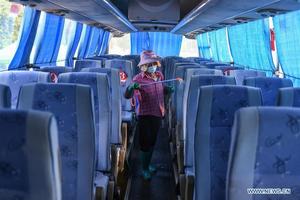 A worker disinfects a bus which will be used to transport students to the Guilinyang Campus of Qiongtai Normal University in Haikou, south China's Hainan province, May 9, 2020. (PU XIAOXU / XINHUA)
A worker disinfects a bus which will be used to transport students to the Guilinyang Campus of Qiongtai Normal University in Haikou, south China's Hainan province, May 9, 2020. (PU XIAOXU / XINHUA)
China will further strengthen its public health emergency response system, as weaknesses have been seen in tackling the COVID-19 pandemic, a health official said on Saturday.
Li Bin, deputy head of the National Health Commission, said at a news conference that the commission will emphasize disease prevention, combining Traditional Chinese Medicine and Western medicine as well as routine practices to better prepare for actual emergencies.
The National Health Commission will emphasize disease prevention, combining Traditional Chinese Medicine and Western medicine as well as routine practices to better prepare for actual emergencies, said Li Bin, the deputy head of the commission
To improve the emergency response system, Li said they will strive to raise the public's awareness and form a unified and efficient leadership and command system.
The commission will also reform disease prevention and control procedures; improve the coordination of risk analysis, evaluation and decision-making; strengthen training and drills; and build a tiered treatment plan; he added.
ALSO READ: Xi: Nation cannot afford complacency
Modern technology-including big data, artificial intelligence and cloud computing-will play a more important role in supporting disease monitoring and virus tracing, prevention and treatment, as well as resource allocation, Li said while emphasizing the significance of speeding up core technological breakthroughs.
He called for improvements in the medical insurance and aid system for major diseases, as well as related laws and regulations, and called for closer international exchanges and cooperation to make China more engaged in global health governance.
The news conference came ahead of the 2020 two sessions, China's biggest political event of the year, which will begin on May 21, when thousands of deputies to the National People's Congress, the legislative body, and members of the National Committee of the Chinese People's Political Consultative Conference, the top political advisory body, will gather in Beijing for political discussions.
During the prevention and control work of COVID-19 earlier this year, national legislators and political advisers made more than 400 proposals and motions. Li said the commission highly valued these opinions and has translated many of them into concrete policies and measures.
READ MORE: Xi: Efforts secure decisive outcome
Last year, the State Council handled 7,162 proposals and 3,281 motions made by national legislators and political advisers in the 2019 two sessions, State Council Information Office spokeswoman Xi Yanchun said at the news conference.
The ministries of the State Council adopted more than 3,000 suggestions, accordingly issued over 1,500 related policies, made public 6,200 replies to the proposals and motions and released more than 250 policy interpretation documents, she added.
She said all ministries have handled the proposals in a "responsible and practical way" and achieved good results, benefiting the progress of the country's poverty alleviation work, innovation and many other reforms.


